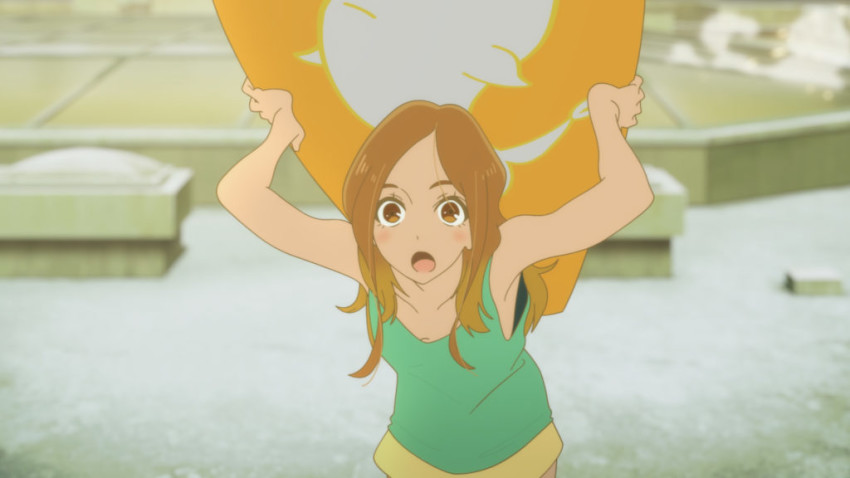Ride Your Wave
August 14, 2020 · 0 comments
By Andrew Osmond.
 Ride Your Wave by director Masaaki Yuasa is a romantic-supernatural drama about a young couple, their love for each other, the wonder of sea and surf, and the magic properties of water. It’s an unpredictable film, with crazy and heart-breaking story developments, and as such, it reflects Yuasa’s anime over the past two decades.
Ride Your Wave by director Masaaki Yuasa is a romantic-supernatural drama about a young couple, their love for each other, the wonder of sea and surf, and the magic properties of water. It’s an unpredictable film, with crazy and heart-breaking story developments, and as such, it reflects Yuasa’s anime over the past two decades.
This was the director who brought us the madcap, lunatic fantasy Mind Game, where the hero gets killed a few scenes in, then escapes from a multi-formed God and spends much of the film exploring the insides of a whale. Since then Yuasa has made romantic-absurdist horror (Kemonozume), science-fiction (Kaiba), a time-looping college comedy (Tatami Galaxy), a sports epic (Ping Pong) and a farce-phantasmagoria set in Kyoto (Night is Short, Walk on Girl).
The last few years, though, have seen extreme swerving even by Yuasa’s standards. First was the 2017 film Lu Over the Wall, a merry kid-friendly fantasy with a finny little girl and echoes of Ghibli’s Ponyo. Somehow Yuasa followed that up with the X-rated hentai apocalypse Devilman Crybaby, the director’s loving tribute to Go Nagai. Even Studio Ghibli’s famously dissonant double-bill of Totoro and Fireflies wasn’t that extreme. Yuasa demonstrably loves skidding all over the shop.
Ride Your Wave is unusual in anime in headlining a young adult couple who have absolutely no trouble connecting. Granted, the firefighter Minato does meet newcomer-to-the-neighbourhood Hinako in absurdly romantic circumstances; he descends to her rooftop to save her from a deadly blaze. But after that, Minato and Hinako click effortlessly and joyously, sharing their lives, their surfing adventures and their fast-blossoming love. It’s encapsulated in an extended montage of their relationship, several minutes long, set to the couple’s own laughably unpolished karaoke song. The director has spoken of “relaxed” animation that shows off the joy of its making; what better metaphor for that than a couple’s karaoke?
Warning: Some spoilers follow, though details will be kept vague.
Eventually, Ride Your Wave brings in a ghost character, though whether it’s a “real” ghost or an imaginary one is unclear. The story, though, definitely doesn’t become a conventional ghost film – there are no supernatural scares or long-haired ladies, and most of the ghost scenes take place in bright sun. Many involve an eccentric oversized prop which is instantly hilarious. This strand has a few comparisons to Ghibli’s “ghost” film When Marnie was There, and rather more to the TV anime Anohana, which helped define the reputation of writer Mari Okada (Maquia).
However, the really interesting comparison is to an anime film that came out only a year before Ride Your Wave. Okko’s Inn is the story of a little girl going through hard times who encounters child ghosts in her family inn – again, they’re utterly unscary ghosts. Like Ride Your Wave, Okko is often cheery and light-hearted, but it also goes some really emotionally intense places. And as it happens, Okko’s Inn and Ride Your Wave were both scripted by the prolific Reiko Yoshida, who also co-wrote Yuasa’s Lu and adapted the anime of A Silent Voice.
Ride Your Wave has story felicities beyond the ghost stuff. It’s a film for viewers who root for those poor second-stringers in the support cast who could have been the leads; especially Minato’s friend and fellow fireman Wasabi, who seems to be so close to connecting with Hinako in the early scenes, but has a different substantial role to play instead. And for viewers who grow irritated with how awed Hinako is by Minato, by this wonderful man’s skills and wisdom… Well, there’s a lovely reversal of perceptions later on. Granted, the way that it’s done is absolutely the kind of thing you’d expect to happen in an anime, but it’s still written and shown so sweetly.
The film also hinges on images of lifesaving, of lifting someone up from the depths of the ocean. Perhaps this grew out of a memorable image in Lu, a beautiful, near-abstract flashback in which a drowning diver encounters a mer-creature which seems both monstrous and angelic. Or perhaps Yuasa was thinking of a life-saving scene from an older anime. His 2020 TV series Keep Your Hands of Eizokuen! starts with a massive and reverential homage to a 1978 serial, Future Boy Conan, directed by Hayao Miyazaki. Conan had a central scene in which a girl frantically keeps the drowning hero alive by swimming repeatedly down to him and breathing air into his lungs, as if she’s saving him with her kisses.
Ride Your Wave is currently streaming on Screen Anime until 24th August 2020, and will receive a home video release from Anime Ltd.
Leave a Reply